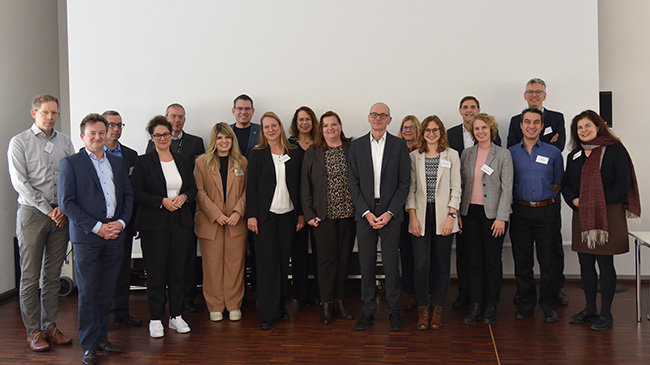2024 Annual Meeting: Dialogue Between the Paul-Ehrlich-Institut and the Pharma Deutschland Association
The annual meeting between experts from the Paul-Ehrlich-Institut (PEI), the Federal Institute for Vaccines and Biomedicines, and representatives from the Pharma Deutschland e.V. association (formerly the German Medicines Manufacturers Association) took place on 30 October 2024. The series of meetings allows for a continuous exchange of information, which is highly appreciated by both parties. Topics of this year's meeting included the Paul-Ehrlich-Institut's activities related to centralised authorisation procedures and national consultations and developments regarding clinical trials. The participants also discussed progress made in the areas of electronic product information and artificial intelligence.
 Source: Paul-Ehrlich-Institut
Source: Paul-Ehrlich-Institut
At the start of the meeting, the Acting President of the Paul-Ehrlich-Institut, Professor Stefan Vieths, gave an overview of the Paul-Ehrlich-Institut's authorisation and consultancy services and of developments regarding clinical trials in Germany.
Centralised Marketing Authorisations, Scientific Advice, and Clinical Trials
The Paul-Ehrlich-Institut has always played a leading role in Europe when it comes to the scientific evaluation of biomedicines within the framework of centralised authorisation procedures. The Institute also offers comprehensive scientific and regulatory advice and contributes significantly to the safety of vaccines and biomedicines in Germany and Europe by monitoring side effects.
Before a clinical trial of a vaccine or biomedicine can be carried out in Germany, it must be approved by the Paul-Ehrlich-Institut. The approval can only be issued after a positive vote from the Ethics Committee. Professor Vieths reported that a total of 805 clinical trial applications were submitted in Germany in 2023, including 310 applications in the field of vaccines and biomedicines. In addition, 278 applications for clinical trial transitions in Germany were submitted in 2023 as part of the transition from the old Clinical Trial Directive (CTD) to the new Regulation (EU) No. 536/2014, the Clinical Trial Regulation (CTR). Of those applications, 153 were submitted in the field of vaccines and biomedicines. The transition ensures that a clinical trial will continue to operate in a legally compliant manner after 30 January 2025.
The work of the Paul-Ehrlich-Institut is characterised by the highest scientific expertise in the areas of regulation and research. Its tasks sustainably reinforce Germany's role in the pharmaceutical sector.
Digitalisation – ePI and AI
The agenda also included a discussion on electronic product information (ePI), which the individual EU Member States are responsible for introducing in accordance with the current draft of the EU pharmaceutical legislation. Representatives from Pharma Deutschland presented the advantages of the ePI, including the ability to provide updates to patients more quickly and easily.
Another meeting topic was the use of artificial intelligence (AI) as a tool in regulation. Experts from the Paul-Ehrlich-Institut presented the progress of the KIMERBA project, which is funded by the Federal Ministry of Health (Bundesministerium für Gesundheit, BMG). The project is focussed on researching AI-supported methods for the efficient evaluation and regulation of biomedicines. The use of the AI tool Scientific Explorer from the European Medicines Agency (EMA) was also addressed.
Moreover, the Paul-Ehrlich-Institut provided information on adjustments to processes resulting from the Medical Research Act.
The Paul-Ehrlich-Institut uses annual dialogues with industry associations such as Pharma Deutschland to continuously develop and optimise its regulatory processes.



